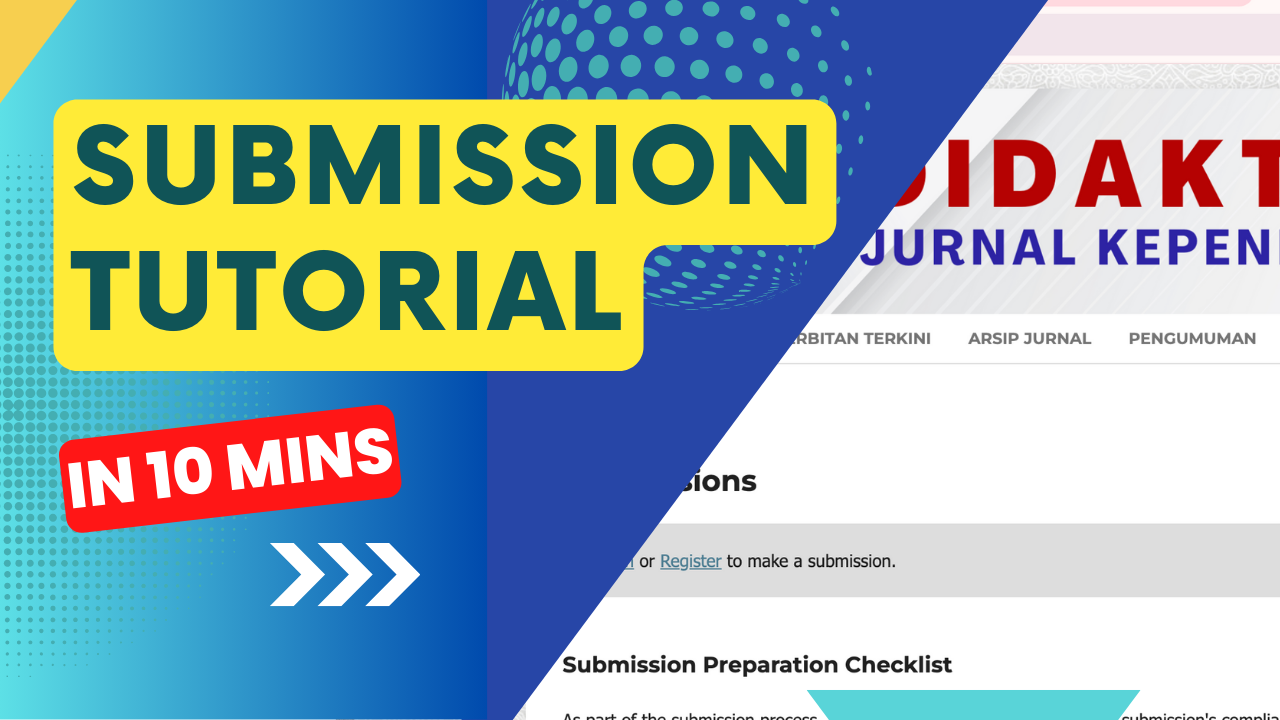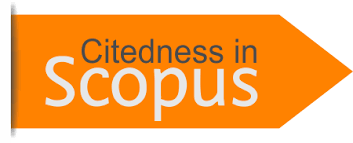Analysis of Pedagogic Content Knowledge Technology (TPCK) Capabilities of Teachers in Senior High School
Abstract
This study investigated the ability of Pedagogic Content Knowledge Technology (TPCK) of teachers in Senior High School. This study aims to assess and analyze (1) the ability of TPCK teachers and (2) its application in the context of learning in the school. The qualitative approach is descriptive, and data is obtained through observation, interviews, and documentation. The results showed that, although the teachers had demonstrated good TPCK skills, there were variations in the level of mastery between them. In terms of application, teachers have integrated technology well into the learning process, although they still face obstacles related to network infrastructure. This research illustrates the complexity of teachers' TPCK capabilities in today's technological era, highlights their success in overcoming challenges, and offers recommendations for improving the use of technology in learning. These findings provide important insights for future educational pedagogy and policy development.
Metrics
References
Absari, N., Priyanto, P., & Muslikhin, M. (2020). The Effectiveness of Technology, Pedagogy and Content Knowledge (TPACK) in Learning. Jurnal Pendidikan Teknologi Dan Kejuruan, 26(1), Article 1. https://doi.org/10.21831/jptk.v26i1.24012
Alvarez, A. V. (2020). Learning from the Problems and Challenges in Blended Learning: Basis for Faculty Development and Program Enhancement. Asian Journal of Distance Education, 15(2), 112–132.
Asad, M. M., Hussain, N., Wadho, M., Khand, Z. H., & Churi, P. P. (2020). Integration of e-learning technologies for interactive teaching and learning process: An empirical study on higher education institutes of Pakistan. Journal of Applied Research in Higher Education, 13(3), 649–663. https://doi.org/10.1108/JARHE-04-2020-0103
Dong, Y., Xu, C., Chai, C. S., & Zhai, X. (2020). Exploring the Structural Relationship Among Teachers’ Technostress, Technological Pedagogical Content Knowledge (TPACK), Computer Self-efficacy and School Support. The Asia-Pacific Education Researcher, 29(2), 147–157. https://doi.org/10.1007/s40299-019-00461-5
Eliyanto, Adesta, E. Y. T., & Fatimah, S. (2021). Islamic Education Teachers’ Technological Pedagogical Content Knowledge (TPACK): A Study in Indonesia. Edukasia Islamika : Jurnal Pendidikan Islam, 6(2), 144–163. https://doi.org/10.28918/jei.v6i2.625
Erlinung, N. (2022). Peranan Guru Pendidikan Agama Islam (PAI) Dalam Membentuk Akhlak Peserta Didik. GUAU: Jurnal Pendidikan Profesi Guru Agama Islam, 2(1), Article 1.
Haleem, A., Javaid, M., Qadri, M. A., & Suman, R. (2022). Understanding the role of digital technologies in education: A review. Sustainable Operations and Computers, 3, 275–285. https://doi.org/10.1016/j.susoc.2022.05.004
Hargreaves, A., & Fullan, M. (2020). Professional capital after the pandemic: Revisiting and revising classic understandings of teachers’ work. Journal of Professional Capital and Community, 5(3/4), 327–336. https://doi.org/10.1108/JPCC-06-2020-0039
Hasriadi, H. (2022). Metode Pembelajaran Inovatif di Era Digitalisasi. Jurnal Sinestesia, 12(1), Article 1.
Hasriadi, H., & Marwiyah, St. (2022). Model Pembelajaran Jarak Jauh Pendidikan Agama Islam Berbasis Teknologi Informasi dan Komunikasi | Jurnal Konsepsi. https://www.p3i.my.id/index.php/konsepsi/article/view/174
Hill, J. E., & Uribe-Florez, L. (2020). Understanding Secondary School Teachers’ TPACK and Technology Implementation in Mathematics Classrooms. International Journal of Technology in Education, 3(1), 1–13.
Hiyaroh, D. E., Salimah, I. D., & Thohir, M. (2022). Perception of Islamic Religious Education Teachers Based on TPACK. EDUKASI : Jurnal Pendidikan Islam (e-Journal), 10(1), Article 1. https://doi.org/10.54956/edukasi.v10i1.308
Iqbal, Md. H., Siddiqie, S. A., & Mazid, Md. A. (2021). Rethinking theories of lesson plan for effective teaching and learning. Social Sciences & Humanities Open, 4(1), 100172. https://doi.org/10.1016/j.ssaho.2021.100172
Kementerian Agama RI. (2009). Al-Qur’an Terjemah dan Asbabun Nuzul. Al-Hanan.
Li, J., & Xue, E. (2023). Dynamic Interaction between Student Learning Behaviour and Learning Environment: Meta-Analysis of Student Engagement and Its Influencing Factors. Behavioral Sciences, 13(1), Article 1. https://doi.org/10.3390/bs13010059
Li, S., Liu, Y., & Su, Y.-S. (2022). Differential Analysis of Teachers’ Technological Pedagogical Content Knowledge (TPACK) Abilities According to Teaching Stages and Educational Levels. Sustainability, 14(12), Article 12. https://doi.org/10.3390/su14127176
Mujiburrohman, Daliman, Amru, H., & M, S. A. (2023). Pengembangan SDM Tenaga Pendidik di Madrasah Aliyah Nurul Islam Ngemplak Boyolali Menghadapi Abad ke-21. Indonesian Journal of Humanities and Social Sciences, 4(1), Article 1. https://doi.org/10.33367/ijhass.v4i1.4191
Nashir, M., & Laili, R. N. (2021). English Teachers’ Perception toward the Switch from Offline to Online Teaching during lockdown in the Midst of Covid-19 Outbreak. EDUKATIF : JURNAL ILMU PENDIDIKAN, 3(2), Article 2. https://doi.org/10.31004/edukatif.v3i2.287
Okebukola, P. A., Suwadu, B., Oladejo, A., Nyandwi, R., Ademola, I., Okorie, H., & Awaah, F. (2020). Delivering High School Chemistry During COVID-19 Lockdown: Voices from Africa. Journal of Chemical Education, 97(9), 3285–3289. https://doi.org/10.1021/acs.jchemed.0c00725
Prasetia, S. A., Khalidiyah, T., & Arif, S. (2021). TECHNOLOGICAL PEDAGOGICAL CONTENT KNOWLEDGE: A New Pedagogical Approach in Islamic Education in the Pandemic Era. Al-Tadzkiyyah: Jurnal Pendidikan Islam, 12(2), Article 2. https://doi.org/10.24042/atjpi.v12i2.9390
Pratiwi, W. R. (2020). The Practice of Digital Learning (D-Learning) in the Study from Home (SFH) Policy: Teachers’ Perceptions. Journal of Southwest Jiaotong University, 55(4), Article 4. http://jsju.org/index.php/journal/article/view/662
Rahmatullah, A. S., Mulyasa, E., Syahrani, S., Pongpalilu, F., & Putri, R. E. (2022). Digital era 4.0: The contribution to education and student psychology. Linguistics and Culture Review, 6(S3), Article S3. https://doi.org/10.21744/lingcure.v6nS3.2064
Rusmulyani, R. (2021). Technical Vocational Education And Training (TVET) Innovation Dengan Model Pelatihan Berbasis Kompetensi Dalam Pengembangan Soft-Skill Sumber Daya Manusia. Jurnal Inovasi Penelitian, 1(8), Article 8. https://doi.org/10.47492/jip.v1i8.318
Sabri, A. (2020). Pendidikan Islam Menyongsong Era Industri 4.0. Deepublish.
Sadiman, S. (2018). Menjadi Guru Super. Bumi Aksara.
Santos, J. M., & Castro, R. D. R. (2021). Technological Pedagogical content knowledge (TPACK) in action: Application of learning in the classroom by pre-service teachers (PST). Social Sciences & Humanities Open, 3(1), 100110. https://doi.org/10.1016/j.ssaho.2021.100110
Sanusi, I. T., Oyelere, S. S., & Omidiora, J. O. (2022). Exploring teachers’ preconceptions of teaching machine learning in high school: A preliminary insight from Africa. Computers and Education Open, 3, 100072. https://doi.org/10.1016/j.caeo.2021.100072
Sayaf, A. M., Alamri, M. M., Alqahtani, M. A., & Al-Rahmi, W. M. (2021). Information and Communications Technology Used in Higher Education: An Empirical Study on Digital Learning as Sustainability. Sustainability, 13(13), Article 13. https://doi.org/10.3390/su13137074
Spiteri, M., & Chang Rundgren, S.-N. (2020). Literature Review on the Factors Affecting Primary Teachers’ Use of Digital Technology. Technology, Knowledge and Learning, 25(1), 115–128. https://doi.org/10.1007/s10758-018-9376-x
Susanto, R., Rachmadtullah, R., & Rachbini, W. (2020). Technological and Pedagogical Models: Analysis of Factors and Measurement of Learning Outcomes in Education. Journal of Ethnic and Cultural Studies, 7(2), 1–14.
Szymkowiak, A., Melović, B., Dabić, M., Jeganathan, K., & Kundi, G. S. (2021). Information technology and Gen Z: The role of teachers, the internet, and technology in the education of young people. Technology in Society, 65, 101565. https://doi.org/10.1016/j.techsoc.2021.101565
Taghizadeh, M., & Hasani Yourdshahi, Z. (2020). Integrating technology into young learners’ classes: Language teachers’ perceptions. Computer Assisted Language Learning, 33(8), 982–1006. https://doi.org/10.1080/09588221.2019.1618876
Copyright (c) 2023 Hasriadi Hasriadi, Nurul Nurul

This work is licensed under a Creative Commons Attribution 4.0 International License.
Dengan mengirimkan naskah artikel, berarti penulis setuju dengan segala kebijakan yang ditetapkan oleh jurnal dan penerbit.
Penulis menyatakan bahwa:
- kebijakan ini telah diketahui dan disetujui bersama oleh semua penulis;
- naskah artikel belum dipublikasikan secara resmi sebelumnya di media ber-ISSN atau ber-ISBN yang terdaftar, kecuali dalam bentuk abstrak atau sebagai bagian dari materi kuliah, atau skripsi/tesis/disertasi yang tidak diterbitkan;
- naskah tidak sedang dalam proses editorial dan dipertimbangkan untuk publikasi di tempat lain;
- publikasi naskah ini telah disetujui oleh semua penulis, institusi afiliasi penulis, otoritas yang bertanggung jawab, dan lembaga di mana kegiatan telah dilakukan;
- naskah berisi materi yang aman dari pelanggaran hak cipta;
Perjanjian Hak Cipta dan Lisensi
- Penulis memiliki hak cipta dan hak kepemilikan lainnya yang terkait dengan artikel.
- Penulis memiliki hak dan diizinkan untuk menggunakan substansi artikel untuk karya-karya penulis berikutnya, termasuk untuk keperluan bahan/materi kuliah dan buku.
- Penulis menyerahkan hak publikasi pertama kepada jurnal dengan di bawah Lisensi Creative Commons (CC BY 4.0).
Pernyataan Lisensi CC BY 4.0
Anda diperbolehkan:
- Berbagi — menyalin dan menyebarluaskan kembali materi ini dalam bentuk atau format apapun;
- Adaptasi — menggubah, mengubah, dan membuat turunan dari materi ini untuk kepentingan apapun, termasuk kepentingan komersial.
Pemberi lisensi tidak dapat mencabut ketentuan di atas sepanjang Anda mematuhi ketentuan lisensi berikut ini.
- Atribusi — Anda harus mencantumkan nama yang sesuai, mencantumkan tautan terhadap lisensi, dan menyatakan bahwa telah ada perubahan yang dilakukan. Anda dapat melakukan hal ini dengan cara yang sesuai, namun tidak mengisyaratkan bahwa pemberi lisensi mendukung Anda atau penggunaan Anda.
- Tidak ada pembatasan tambahan — Anda tidak dapat menggunakan ketentuan hukum atau sarana kontrol teknologi yang secara hukum membatasi orang lain untuk melakukan hal-hal yang diizinkan lisensi ini.






.png)








